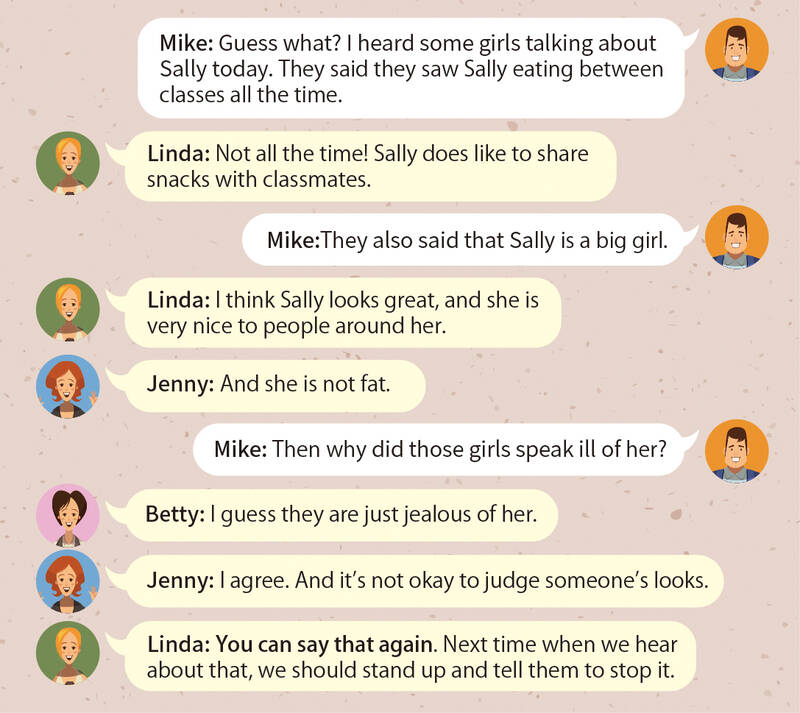Some students are talking about gossip in a chatroom.
一些學生在聊天室裡討論一則八卦。
Mike: Guess what? I heard some girls talking about Sally today.

Jenny: What did they say?
Mike: They said they saw Sally eating between classes all the time.
Linda: Not all the time! Sally does like to share snacks with classmates.
Betty: That’s true.
Mike: They also said that Sally is a big girl.
Betty: I think Sally has a big heart.
Jenny: And she is not fat.
Linda: I think Sally looks great, and she is very nice to people around her.
Mike: Then why did those girls speak ill of her?
Betty: I guess they are just jealous of her.
Jenny: I agree. And it’s not okay to judge someone’s looks.
Linda: You can say that again. Next time when we hear about that, we should stand up and tell them to stop it.
必備單字
1. guess v. 猜
(國中基礎1200字)
2. share v. 分享
(國中基礎1200字)
實用字詞
1. speak ill of others (behind their backs)(在背後)說人壞話
2. be jealous of someone
妒忌某人
閱讀技巧:
將長句分成短字詞,以利閱讀
They said/they saw Sally eating/between classes/all the time.
他們說/他們看到莎莉吃東西/下課期間/總是。
斷句練習:
And it’s not okay to judge someone’s looks.
解答:
And it’s not okay /to judge /someone’s looks.
而且這樣不好/去評斷/別人的外表。
考題練習:
TOEIC Bridge測驗 X 國中會考題型
1. What is true about Sally?
(A) Sally is the biggest girl in class.
(B) Sally often shares something to eat at school.
(C) There is something wrong with Sally’s heart.
2. What can be inferred from the reading?
(A) Sally is a student.
(B) Sally was born in a rich family.
(C) Sally is jealous of her classmates.
3. What does Linda’s “You can say that again” mean?
(A) I can’t hear you.
(B) It’s better not to say it.
(C) I totally agree with you.
解答:
1. (B) 2. (A) 3. (C)
文章由TOEIC Program Taiwan · Chun Shin提供:
www.facebook.com/ToeicProgramTaiwan

Bilingual Story is a fictionalized account. 雙語故事部分內容純屬虛構。 Emma had reviewed 41 resumes that morning. While the ATS screened out 288 unqualified, she screened for AI slop. She could spot it a mile away. She muttered AI buzzwords like curses under her breath. “Team player.” “Results-driven.” “Stakeholder alignment.” “Leveraging core competencies.” Each resume reeked of AI modeling: a cemetery of cliches, tombstones of personality. AI wasn’t just changing hiring. It was draining the humanity from it. Then she found it: a plain PDF cover letter. No template. No design flourishes. The first line read: “I once tried to automate my

Every May 1, Hawaii comes alive with Lei Day, a festival celebrating the rich culture and spirit of the islands. Initiated in 1927 by the poet Don Blanding, Lei Day began as a tribute to the Hawaiian custom of making and wearing leis. The idea was quickly adopted and officially recognized as a holiday in 1929, and leis have since become a symbol of local pride and cultural preservation. In Hawaiian culture, leis are more than decorative garlands made from flowers, shells or feathers. For Hawaiians, giving a lei is as natural as saying “aloha.” It shows love and

A: Hard rock band Guns N’ Roses and pop diva Lady Gaga are finally touring Asia again. B: Are they also coming to Taiwan? A: The band will stage a show at the Taoyuan Sunlight Arena on Saturday. B: Wow, so this will be the band’s third visit. I really love its 1992 power ballad “November Rain.” The nine-minute hit was the Billboard chart’s longest song at one point. A: Let’s go celebrate the 40th anniversary of its release. A: 硬式搖滾天團槍與玫瑰、女神卡卡終於再度展開亞洲巡演了。 B: 他們也會來台巡演嗎? A: 槍與玫瑰本週六即將在桃園陽光劇場開唱唷。 B: 哇這將是該團第三次來台演出,我超愛他們1992年強力情歌《November Rain》,全長近9分鐘還曾是告示牌排行榜最長神曲。 A: 那我們一起去慶祝該團出道40週年吧! (By Eddy Chang, Taipei Times/台北時報張迪)

A: Hard rock band Guns N’ Roses is touring Taiwan tomorrow. What about pop diva Lady Gaga? B: Unfortunately, Singapore has once again exclusively secured Gaga’s concerts in Asia, just like Taylor Swift’s exclusive Asian shows last year. A: The Singaporean government reportedly paid up to US$2.2 million to secure Swift’s shows. B: And the shows did boost its economy and tourism. A: But I’m angry about this approach, so I’m not going to Gaga’s shows this time. A: 硬式搖滾天團槍與玫瑰明天即將來台,流行天后女神卡卡呢? B: 真可惜,新加坡再度取得卡卡亞洲巡演的獨家主辦權,就像去年泰勒絲的亞洲獨家演出一樣。 A: 據報導新加坡政府付出高達220萬美元,取得泰勒絲的亞洲獨家主辦權。 B: 而她的秀也的確提振了該國的經濟和旅遊業。 A: 但我對此還是很不爽,所以不去新加坡看卡卡了! (By Eddy Chang, Taipei Times/台北時報張迪)